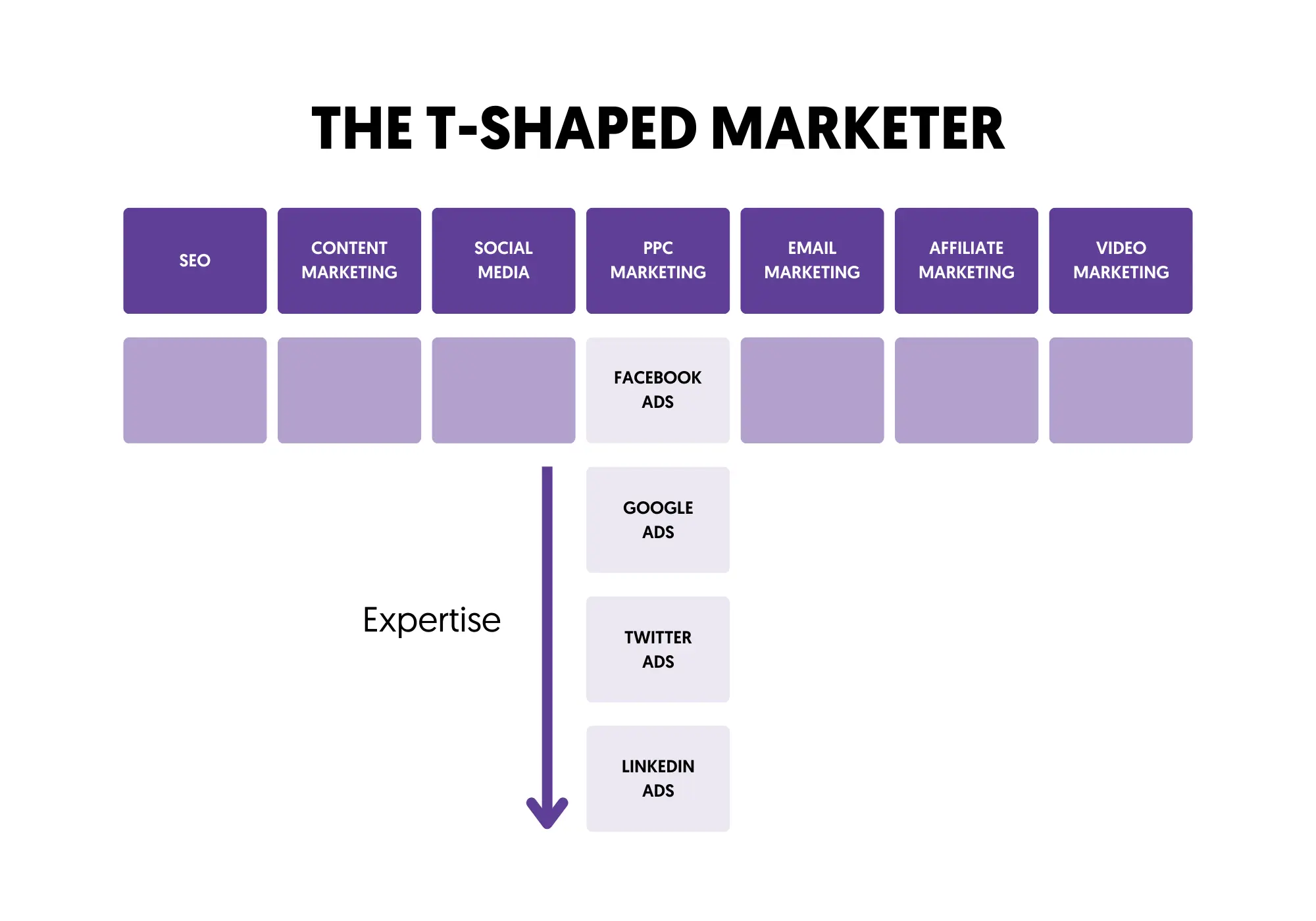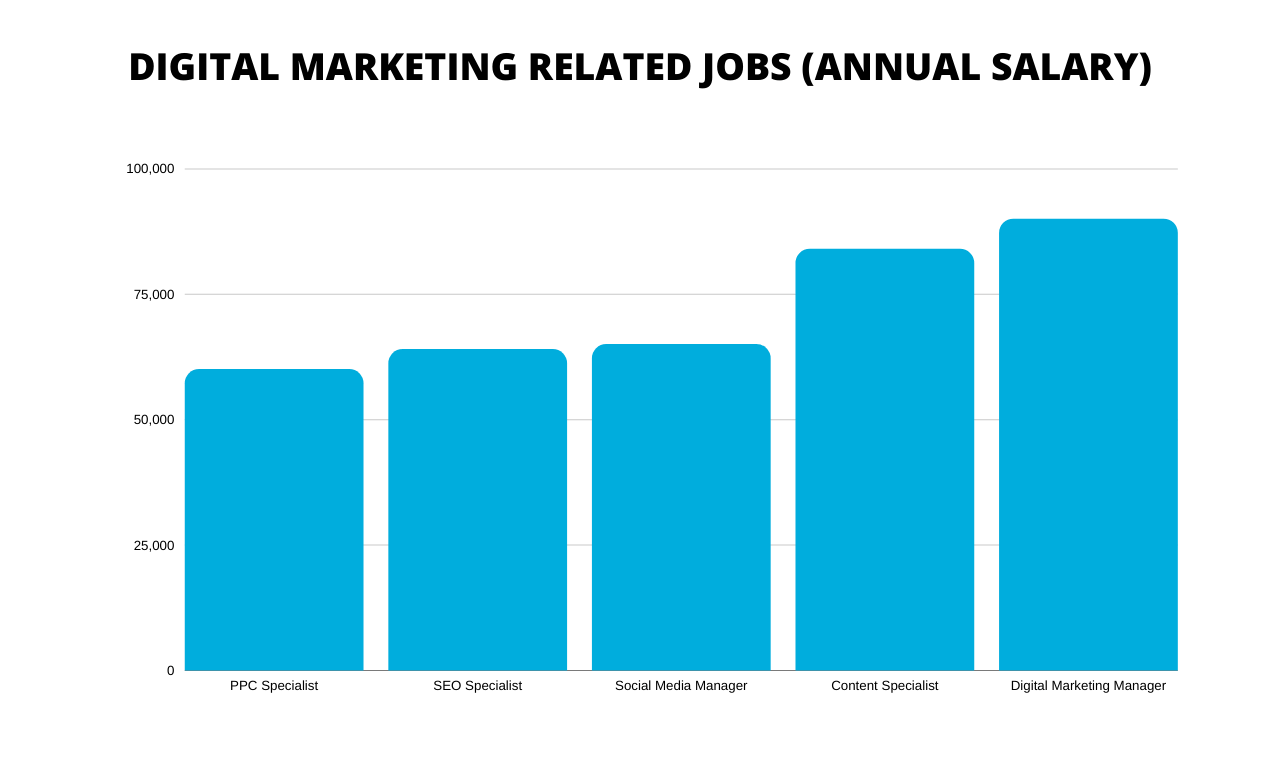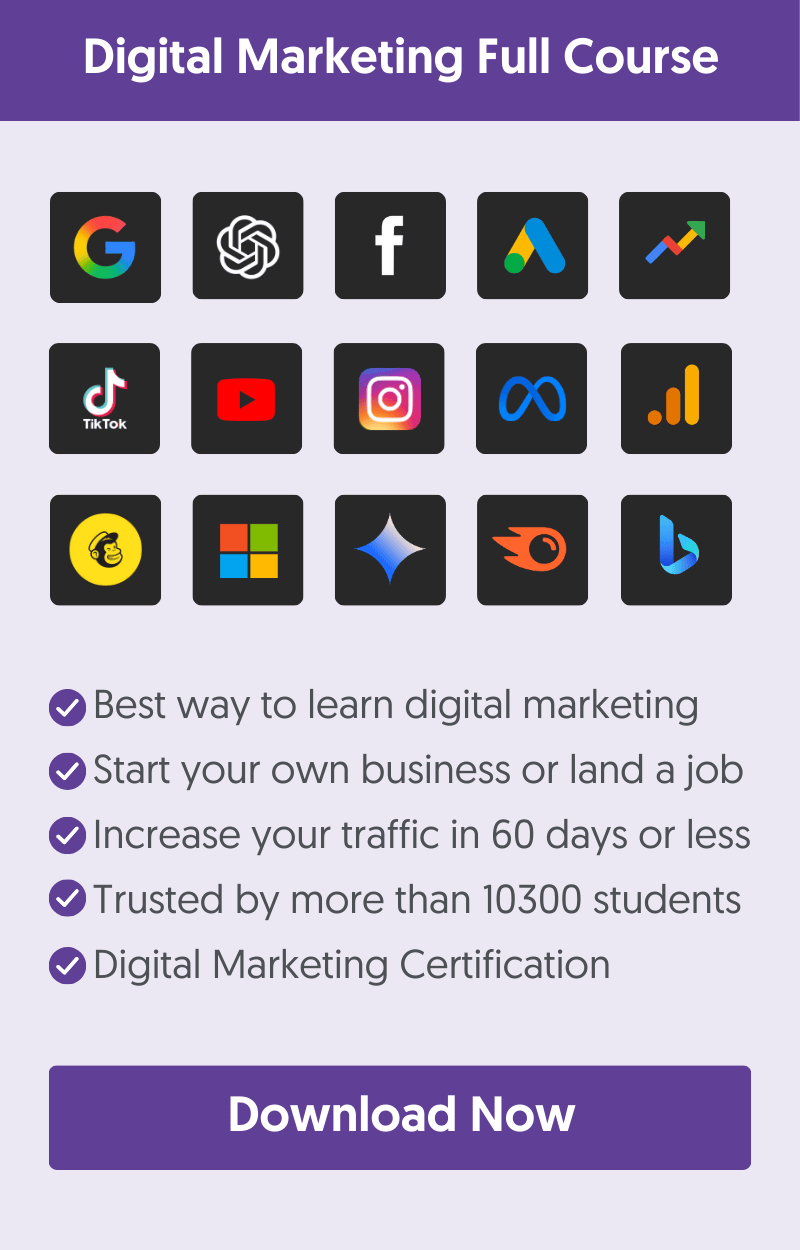- 1. Practice Digital Marketing
- 2. Get a Digital Marketing Certification
- 3. Replicate Successful Practices
- 4. Choose Your Specialization
- 5. Follow Industry Trends
- 6. Build Your Personal Brand
- 7. Improve Your Analytics And Reporting Skills
- 8. Test, Test, And Then Test More
- 9. Work With Experienced Digital Marketers
- 10. Network With Digital Marketing Professionals
- Other Essential Skills For Digital Marketers
Like any other skill, digital marketing has to be trained. It doesn’t come naturally to anyone. We’ve already gone through the digital marketing journey, and today, we’ll teach you exactly how to train yourself in digital marketing.
Here is how to become better at digital marketing and advance your digital marketing career.
1. Practice Digital Marketing
The first step towards improvement is putting your skills into action. While reading up on the topic is helpful, there’s only so much information you can benefit from before you can put that information to the test.
Like any skill, digital marketing requires practice, and what better place to practice than your own website?
Practicing digital marketing on your blog does two things:
- It helps you build your brand on your own terms, at your own pace, and with your own platform.
- It allows you to gain experience in marketing while building your brand at the same time.
It’s a win-win really, so there’s no reason not to.
Creating a website is relatively simple. You can use a platform like WordPress to get a functional website up and running within hours.
2. Get a Digital Marketing Certification
In my experience, many newer digital marketers hesitate to get into digital marketing because they don't know how to start. If you’re doing it alone, teaching yourself digital marketing can feel like you’re lost at sea with no compass.
And that’s where digital marketing courses come in. Instead of wasting time deciding what you need to learn, you can save tons of time(and sanity) by following a course created by established experts.
You’ll have more direction on your learning journey and know the information you’re absorbing is practical and up-to-date.
Separating the high-quality courses from the chaff can be tough, though, so here are a few things to look out for:
Social Credit - If a course has no reviews, testimonials, or students with proven results, it’s probably not worth taking the risk and investing your hard-earned cash.
Within Your Budget - You shouldn’t have to pay for an arm and a leg for a course. Plenty of training programs on the market provide a ton of bang for your buck.
Actionable Advice - Marketing theory is great, but only if it’s accompanied by advice that helps you take action. Make sure your course provides clear steps to help you on your journey.
A “Full Scope” Course - Digital marketing is more than just one narrow topic. It is a wide range of techniques and industries, so your course should cover everything from Google Analytics and keyword research to creating your first SEO blog.
Resources to Learn More
3. Replicate Successful Practices
As the old saying goes, “Practice what you preach.” Unfortunately, many digital marketers don’t follow that advice. You’ll often find that the lessons marketers teach aren’t the same lessons they employ in their own businesses.
This is to say, It’s okay to take successful marketers’ lessons with a grain of salt if you pay attention to their own marketing strategies, too.
- Do they implement PPC and/or SEO?
- Where do they advertise? What kind of keywords do they target?
- How often do they post content?
- What kind of content do they post most often?
- What are their main channels for bringing in leads?
To add to this, don’t just look for the good aspects of their marketing. Find out where you think it could improve too.
- Do their clients and customers have any common complaints?
- Are there any unnecessary gaps in their pipeline?
- How does their customer service stack up?
- Is their brand lacking?
Once you’ve got all of this down, you’ll know how to improve and understand how to outpace the competition — which means you’ll have a much clearer direction moving forward.
4. Choose Your Specialization
“Jack of all trades, master of none”.
Remember, if you generalize your skillset, you won’t be able to build expertise in one of those skills. Instead of blending in with the crowd, pick an area to specialize in and focus on it. Someone who’s an expert in one trade will almost always beat the generalist.
Branch out into the neighboring trades once you’ve built expertise in that subject.

For instance — instead of becoming a “digital marketer,” become a “content marketing specialist.” Then, once you’ve learned the ins and outs of content marketing, branch out to email marketing and PPC.
Resources to Learn More
5. Follow Industry Trends
I’ll admit it: this is an easy tip to miss. In the digital world, trends come and go quickly — but the best marketers need to keep up with those trends and adapt.
One great way to do this is to keep an eye on popular marketing blogs and find out what practices they advocate for and against. As mentioned in tip 3, ask yourself if those practices are the same ones they implement.
Your competitors’ websites are also great places to look for upcoming and current trends.
Keep a running list of your top competitors and visit their websites from time to time. When you notice a practice that most of your competitors are adopting, it may be time to join the trend.
6. Build Your Personal Brand
We already discussed why brands are so important, so let’s move on to the good part: how to build one.
Creating a brand is about separating yourself from the crowd and building your own following.
As mentioned before, blogging is one great way to build your following and establish expertise in your field, but you can still take it one step further by guest posting.
I recommend taking note of the top blogs in fields similar to your own, and then looking for “gaps” in their content.
And by “gaps,” I mean opportunities that you can fill.
For example, let’s say you’re an SEO marketer — You could write a piece for a blog about PPC combining the two strategies.
Instead of looking for monetary payment, you could reach out to offer that post for an author byline and a backlink to your blog, effectively giving you free publicity with a new audience.
Side note: it’s best to stray away from guest posting on smaller or unreputable websites as it may have the opposite effect. Or you could revamp your social media presence and build a following through that channel.
The best way to build an audience on a popular platform is to post high-quality content and engage with your following regularly.
Any business can share a post every so often, but very few make the effort to connect on a deeper level with their followers.
7. Improve Your Analytics And Reporting Skills
Without data to work off of, marketers are basically flying blind.
How do you know whether your approach is effective or unprofitable? What information can you use to optimize a campaign properly?
Well, as you probably know — The answer is data.
But just having the data in front of you isn’t going to help; you need to know how to use that data to improve.
Which is why reporting skills are some of the most critical ones there are. To start, take some time to learn how Google Analytics & the Search Console work. These two tools are going to be cornerstones for your whole operation, so the earlier you learn them through and through — the better.
Next, you’ll want to learn how to use tools to streamline your reporting process — programs like Excel or Google Sheets help organize data and simplify the reporting process.
And lastly, learn your way around the marketing tools you use regularly.
Keyword planners, SEO tools, and CRMS can be tricky to get used to, so reading through relevant knowledge bases and blog posts and watching video guides on the topics is worthwhile.
Alright, so we’ve covered how to use data, but let’s talk about how you can acquire it in the first place.
8. Test, Test, And Then Test More
No company has ever grown hugely successful by staying in the comfort zone.
You'll always be left behind if you never venture out and try new approaches. You must test new ideas to break free of the crowd and become a pioneer.
That’s not to say you should test any new idea that comes to mind. It’s all about using your previous data to develop and test new strategies.
Once you get that data, you’ll better understand what works, what doesn’t, and how you should approach marketing going forward.
The formula for testing goes like this: Test new ideas, find the best techniques, redevelop your marketing approaches using the data, then rinse and repeat.
9. Work With Experienced Digital Marketers
The best way to grow richer is by surrounding yourself with people who are wealthier than you.
By learning from them, you’ll naturally learn the strategies and practices they use to build that wealth.
And that’s not just referring to money. Surrounding yourself with people more knowledgeable than you can be a massive learning experience too.
And the best way to surround yourself with more knowledgeable marketers is by working where they work.
If you want to start a marketing career and have no idea where to start, I recommend getting an entry-level job at a digital marketing company. Even if it’s not your end goal, you can consider it an apprenticeship.

Remember, the job isn’t about your salary, either — it’s about learning all you can from the marketers who’ve been in the game longer than you. (though the salary is certainly a nice bonus!)
10. Network With Digital Marketing Professionals
No matter your field, no one can do it alone. Or at least, doing it alone makes things much more challenging.
While it might not seem necessary, networking with other marketers is a critical step toward success. There’s a caveat, though: the keyword is “networking” and not “asking for unwarranted help.”
If your sole goal for networking is to ask for assistance, you won’t get very far. (and it won’t be all too fun, either)
Instead, your goal should be building genuine connections with people in your industry. Reach out, start conversations, make friends, and establish yourself as an equal with your colleagues.
One of my all-favorite rules for marketing, networking, and business goes like this: “Don’t expect to receive value unless you’re willing to provide it.”
Whether it’s customers, colleagues, or investors, the only way to get help is to help people get closer to their own goals.
It’s not hard to do either, providing value could be as simple as providing advice through platforms like LinkedIn or guest posting for free.
Other Essential Skills For Digital Marketers
To become a successful digital marketer, you need to build the following skills:
Brand-Building - Your brand is the cornerstone of your business. Think about it — What really differentiates Reebok from Adidas shoes?
A die-hard fan of either company probably doesn’t decide based on product quality; they choose because of the brands. And in the same way, how do you differentiate yourself from competitors? To do it, you’ll need a brand.
And if branding is one of your current focuses, here’s what you need to improve:
- Social Media Marketing
- Reputation Management
- Customer Service Skills
Resources to Learn More
Direct-Response Marketing - This one is pretty straightforward — the type of marketing that (ideally) results in direct action from your audience. Writing direct response email campaigns would be a good example.
The reason that direct-response marketing is so important is pretty apparent, so if you feel this is an area you need to work on, here’s a list of digital skills that will help:
- Email Marketing
- Copywriting
- Sales Skills
- Competition Analysis
- Ad Testing & Performance Analysis
Resources to Learn More
“Investment Marketing” Skills - Now, when I say “investment marketing,” what does that mean? Well, it’s the same idea as a personal investment.
If you invest in a company’s stock, you probably aren’t looking for immediate returns or even short-term returns on that investment. (unless you’re day trading)
Investment is about large returns over an extended span of time. While that initial investment doesn’t yield much in the beginning, it compounds on itself and grows to something great. And investment marketing is the same.
Blogging is an excellent example of this; you’ll very rarely see results from SEO and content marketing within the first couple of months.
But once the ball is rolling? You’ll see results from your content that continues for years to come.
Want a marketing machine that yields indefinite, long-term returns? Here are some things you’ll need to know:
- Blogging & Content Marketing
- SEO
- Audience Nurturing
Resources to Learn More



